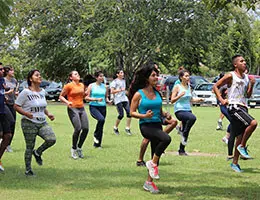 To delve into the concept of physical culture , it is convenient to first define the terms that make up the expression. The idea of culture , in this framework, can refer to the knowledge that makes it possible to understand a topic and form a critical judgment. Physical or physical, on the other hand, can refer to the physical.
To delve into the concept of physical culture , it is convenient to first define the terms that make up the expression. The idea of culture , in this framework, can refer to the knowledge that makes it possible to understand a topic and form a critical judgment. Physical or physical, on the other hand, can refer to the physical.
Physical culture, therefore, encompasses knowledge about sport and gymnastics that allows for the full development of the body's capabilities. The notion is also linked to the practice of these activities that pursue the aforementioned development.
Habits related to body care are also part of physical culture, which allows us to preserve health in all its dimensions. A person with knowledge of physical culture understands the value of sports activity and has the necessary tools to achieve well-being.
Beyond gymnastics and sports that allow us to combat a sedentary lifestyle, physical culture also includes notions of nutrition . Choosing food carefully is a very important part of taking care of your body: someone who only eats junk food will not enjoy a healthy state even if they practice sports every day.
A widely used synonym for physical culture is physical education , the name given in many countries to the school subject that focuses on physical exercises, that is, gymnastics. In this area, physical culture is one of the factors that divides students, stigmatizing some for their lack of ability or motor problems.
The imposition of these activities during childhood and adolescence with the pressure to exceed certain goals to receive a sufficient grade is a real torture for millions of children whose bodies are not in shape. Teasing, both from students and teachers, destroys their self-esteem and pushes them to avoid physical exercise at all costs, while worsening their eating habits to calm the anxiety caused by humiliation.
 However, if physical culture is taught appropriately in schools it can be very beneficial for everyone, especially for those students whose health is not optimal. Precisely, the objectives of this subject are, among others, to prepare the individual to take responsibility for their own habits and customs as far as the health of their body is concerned.
However, if physical culture is taught appropriately in schools it can be very beneficial for everyone, especially for those students whose health is not optimal. Precisely, the objectives of this subject are, among others, to prepare the individual to take responsibility for their own habits and customs as far as the health of their body is concerned.
Some studies have shown that certain heart diseases manifest from birth to two years of age and usually last until almost twenty years of age; If during these two decades of development the person does not acquire adequate habits to maintain their health and physical condition, the likelihood of suffering from obesity or high blood pressure in adulthood increases.
Regarding the history of physical culture, it dates back to prehistory; In its early days, people did physical exercise as part of their daily routine and this helped them survive. Already in Classical Greece, these principles became more sophisticated and were applied to the training of men of action. The Spartans tried to combine this profile with that of the wise man through a program that received the name "Palestral."
Bodybuilding or bodybuilding , on the other hand, is the practice of sports or gymnastics aimed at excessive muscle development. In this case, knowledge and physical activity are aimed at muscle hypertrophy for aesthetic or competitive purposes. Many bodybuilders resort to the use of steroids to increase muscle mass, a decision that involves a risk for the body.
